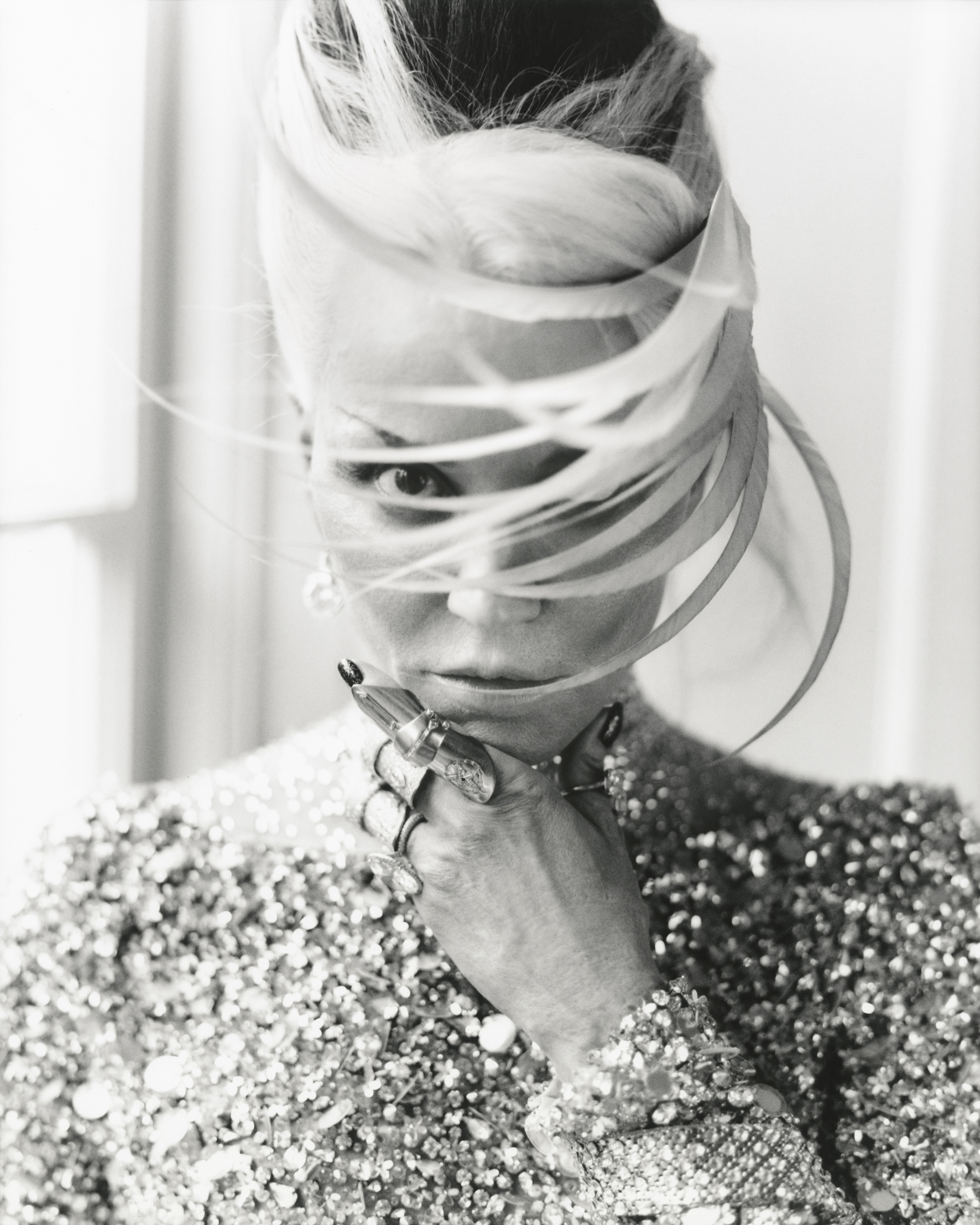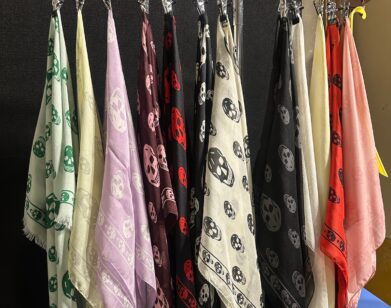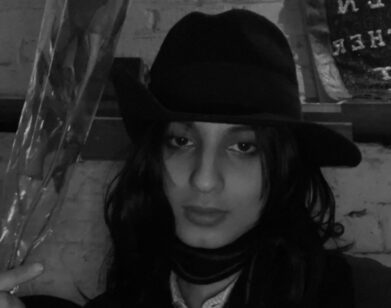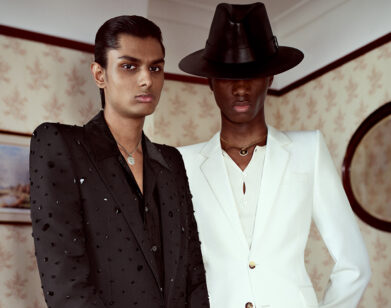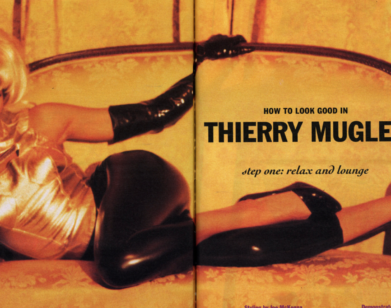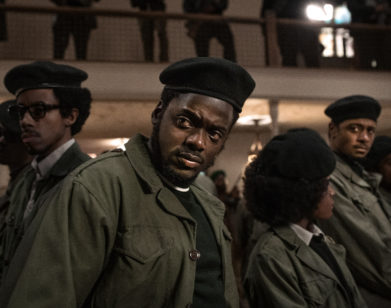HEIRESS
Daphne Guinness and RuPaul on Privilege, Couture, and The Art of War
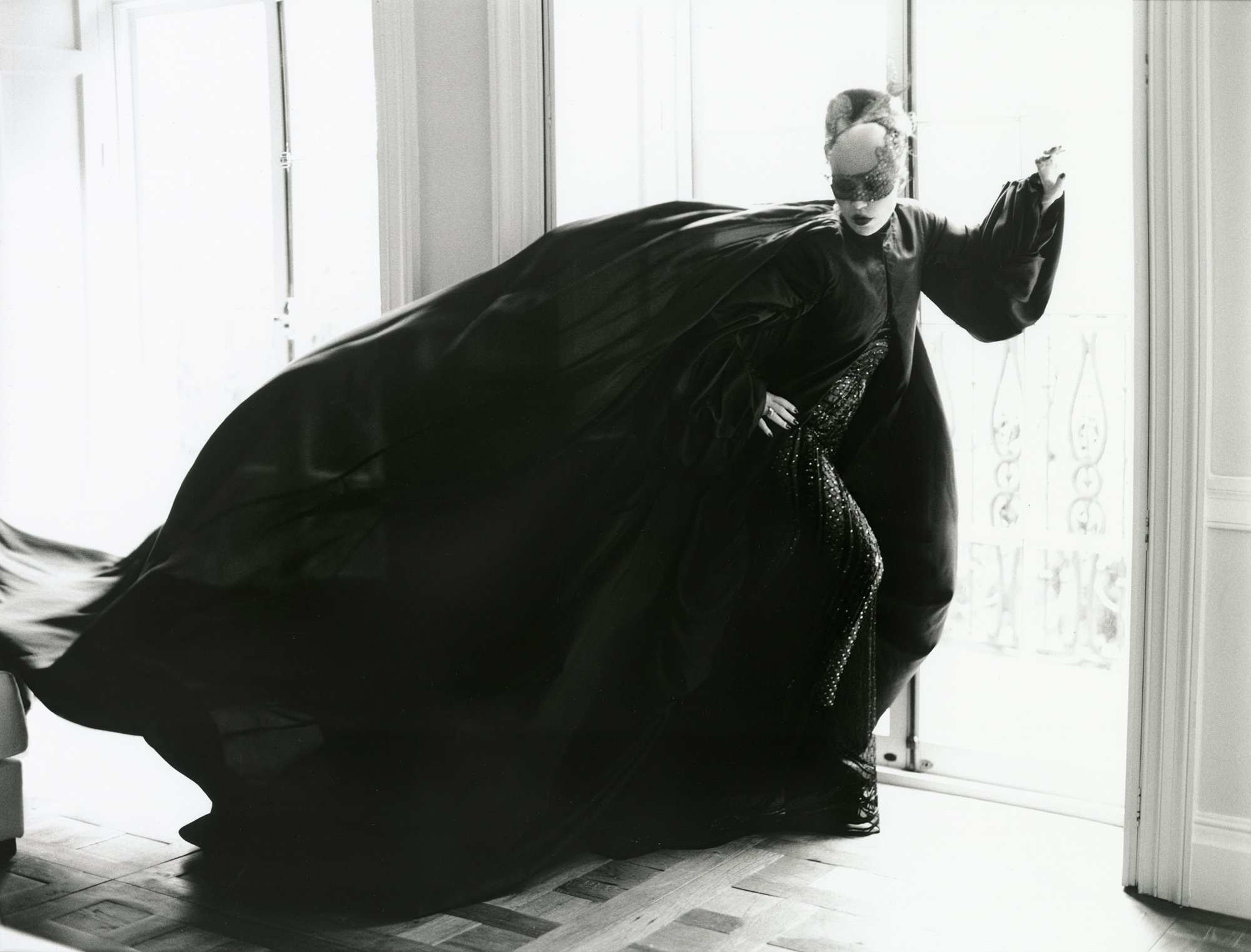
Daphne Guinness wears vintage Alexander McQueen FW02 cape and FW07 dress, Bodysuit, Phillip Treacy Headpiece, Rings, and Shoes Daphne’s Own.
After spending weeks trying to get in touch with RuPaul so he could interview Daphne Guinness—the mercurial model, musician, and patron of haute couture—a recording landed in our senior editor’s inbox. Ru had already interviewed Daphne in person, presumably at some fabulous abode where the London-based fashion icon was staying. But, after discussing motherhood, money, and hara-kiri, the conversation ends abruptly, as if the heir to the Guinness fortune had decided that some things are for mother’s ears only.
———
RUPAUL: Is it recording?
DAPHNE GUINNESS: Yes.
RUPAUL: Okay great. So you’ve been working on this album for as long as I’ve known you.
GUINNESS: That’s correct. I started it two years ago.
RUPAUL: It feels longer. [Laughs]
GUINNESS: It feels like a lifetime.
RUPAUL: But it’s so worth it. First of all, I heard “Misha” today—
GUINNESS: “Mishima.”
RUPAUL: What does that mean?
GUINNESS: Yukio Mishima was a Japanese writer. When I was between the ages of about two- and-a-half and five I had a Japanese nanny, and I believe it was a week after my third birthday he committed suicide.
RUPAUL: Oh my gosh.
GUINNESS: And my father found me on the back staircase of our house in Kensington Square trying to recreate the scene of Mishima’s death. So this song is my ode to Mishima and my nanny Atsuko.
RUPAUL: Who told you that Mishima committed suicide when you were 3 years old?
GUINNESS: My nanny.
RUPAUL: Wait a minute, let me get this straight. Mishima was not your nanny?
GUINNESS: No, Mishima was a very famous writer and national hero, and he committed seppuku. It’s a really interesting story. The whole of Japan was in mourning.
RUPAUL: Did he commit hara-kiri? What do you call it?
GUINNESS: Yes. Seppuku.
RUPAUL: How long was she your nanny?
GUINNESS: About two and a half years.
RUPAUL: Well that explains everything.
GUINNESS: [Laughs] It does! And do you know what’s so bizarre? I have scars on my stomach because of the operations I’ve had to have. So I have that seppuku scar.
RUPAUL: Why is hara-kiri a thing in Japanese culture?
GUINNESS: You have to get through the liver and all the main arteries so you bleed out.
RUPAUL: Aside from the obvious, why would someone commit hara-kiri?
GUINNESS: To make a point and have an honorable death.
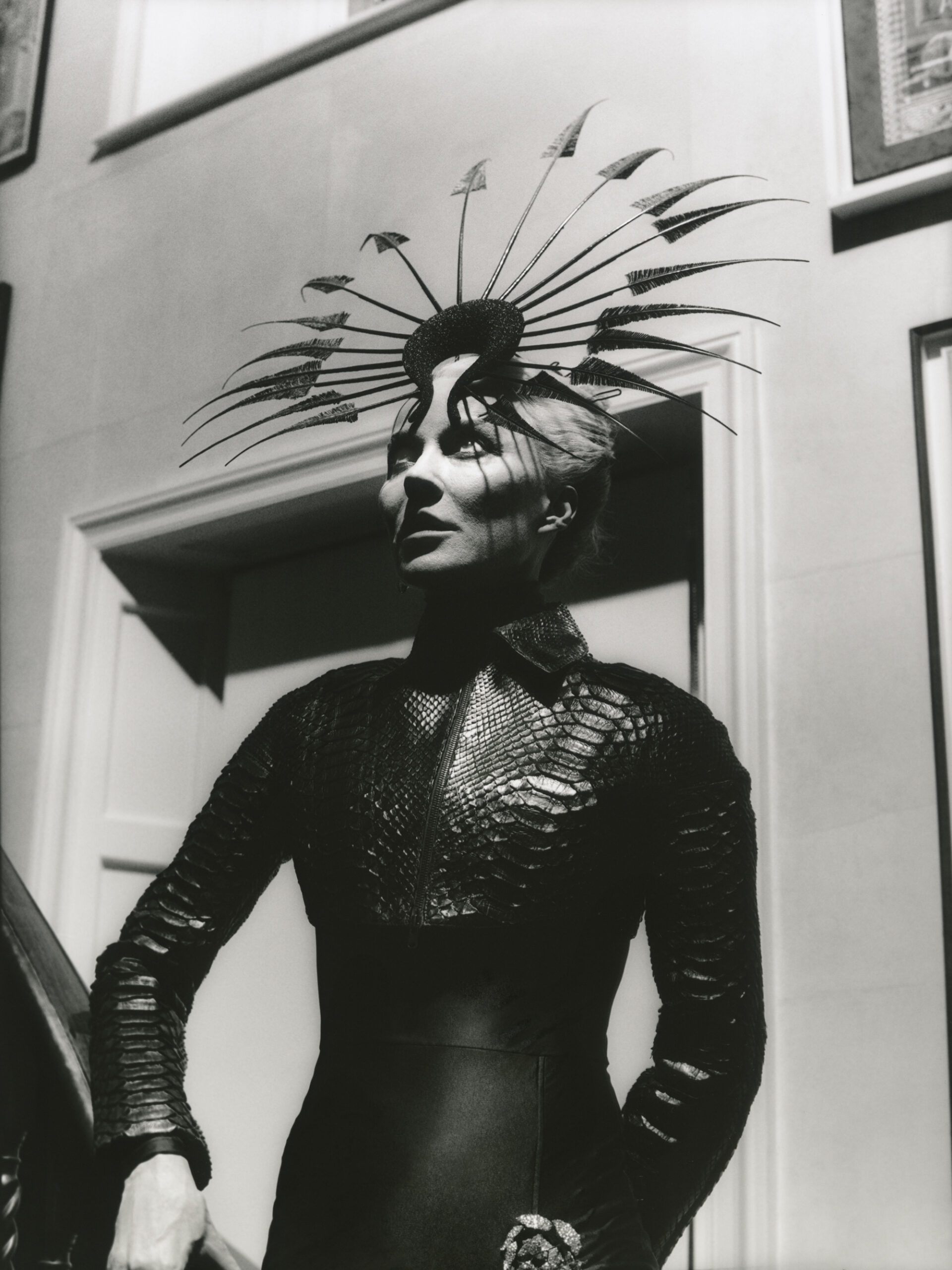
Vintage Alaïa Bolero, Balenciaga Dress, Phillip Treacy Headpiece, Earring, and Vintage Christian Lacroix Haute Couture Brooch Daphne’s Own
RUPAUL: But then you think, for who?
GUINNESS: It does seem pretty extreme, but it’s beautiful as well.
RUPAUL: It’s beautiful, it’s gorgeous, and it is taking life very seriously.
GUINNESS: It is. My great-grandfather was one of the first English diplomats to go into Japan in 1870. He was witness to the last shogun wars and saw the warriors execute seppuku at the end of battle. He went on to translate a lot of the ancient fairy tales from Japanese to English. He lived there for maybe a decade. So I’ve always had a deep love for Japan and its culture. And the guitar you hear on “Mishima” is a shamisen. I went into the middle of Japan to find it in 2012.
RUPAUL: Who is performing the spoken part of the song?
GUINNESS: That is me and a Japanese engineer called Shuta who works with a friend of mine.
RUPAUL: How many tracks are there on the album?
GUINNESS: Eleven. I wrote 16, but I’ve narrowed it down.
RUPAUL: Thank god.
GUINNESS: [Laughs] The whole album will be out around November, but I’m planning to release singles before then and do some small performances. I’m sort of making it up as I go along.
RUPAUL: When I heard “Mishima” I felt like you finally found your voice.
GUINNESS: Oh, thank you.
RUPAUL: Not just literally but figuratively, too. It feels like you are coming through in a way that people aren’t prepared for. Everybody has an idea of you because you’ve basically been silent your entire public life.
GUINNESS: [Laughs]
RUPAUL: So why now? Why did you decide to reveal yourself?
GUINNESS: I think it has something to do with feeling more confident. I’ve always been able to sing, but it gets to a point where it starts to feel second nature. You either double down and commit to it or you give it up forever. In the act of giving in, your true self comes out.
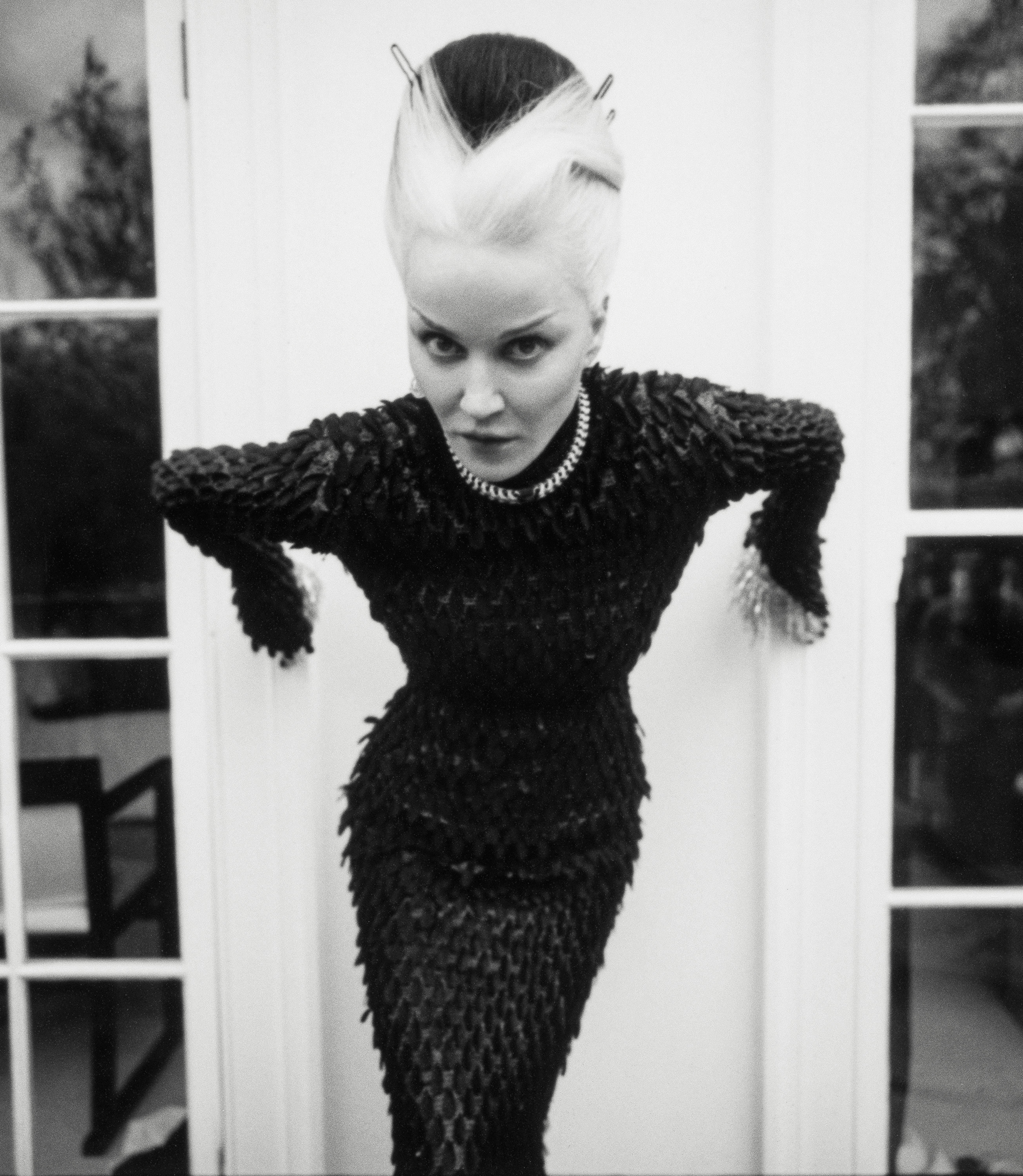
Dress Gaultier Couture. Necklace Cartier. Earring and Vintage Pauline Trigère Bracelets Daphne’s Own.
RUPAUL: That’s definitely what’s happening because you are more out there now. You’ve done our television show [RuPaul’s Drag Race] twice now—
GUINNESS: I love doing that.
RUPAUL: And that seems so unlike the woman we see in the pictures. What made you decide to do our show?
GUINNESS: Well, you. You are so charming. [Laughs] I trust you and you’re wonderful and I also believe in what you’re doing. I was so flattered to be asked to do anything.
RUPAUL: But you’ve been asked to do television before?
GUINNESS: I have, but I’ve also been pretty unavailable. I’d been living in the middle of Ireland or on the edge of a desert. I haven’t been around to make a solid plan. But I met you on a Sunday and think I was on your show on Tuesday. [Laughs]
RUPAUL: That’s right. [Laughs]
GUINNESS: I was like, “Okay, this is happening.” I was very nervous.
RUPAUL: Really? Why do you think you get nervous?
GUINNESS: I suffer from massive anxiety, which is what I’m in the process of figuring out. That has actually improved my life, being able to get to the bottom of it.
RUPAUL: Well, the obvious answer would be a concern with how people perceive you.
GUINNESS: I’ve always felt like an outsider. Growing up, on the one hand I had immense freedom, but then on the other hand I was trying to fit in with English boarding schools where everybody has a pony.
RUPAUL: How much of this do you think has to do with being from an extremely privileged background?
GUINNESS: The privilege made you feel like you were something other, but in some ways you don’t feel “other” at all. Does that make sense?
RUPAUL: It makes complete sense.
GUINNESS: I mean, my favorite book as a kid was The Art of War by Sun Tzu.
RUPAUL: [Laughs]
GUINNESS: It’s true.
RUPAUL: “Mummy, read me my favorite book.”
GUINNESS: [Laughs] My dad would read to me. I’d recreate battles and everything.
RUPAUL: I think people are interested in what that childhood might have been like. We have an idea that through being privileged you might have felt deprived in some ways.
GUINNESS: I mean, I would get 40p pocket money a week until I was about 16.
RUPAUL: What is that in American money?
GUINNESS: It’s less than a dollar.
RUPAUL: [Laughs]
GUINNESS: I was always in debt to everyone. And the way I would get money out of my dad was to make him stand on his head so the money would fall out of his pockets.
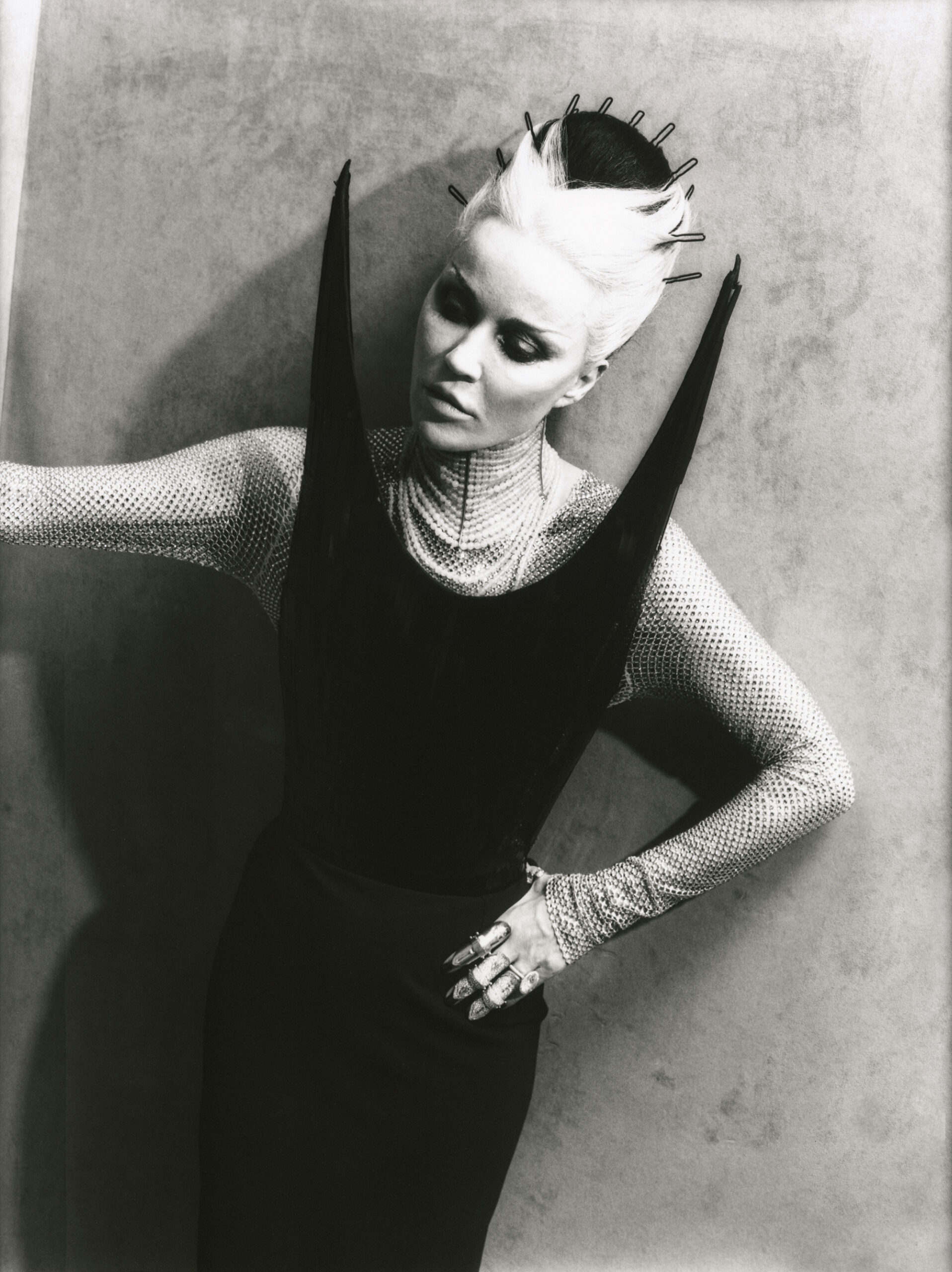
Corset and Skirt Schiaparelli Haute Couture. Bodysuit Giambattista Valli Haute Couture. Vintage John Galliano for Christian Dior SS98 Necklace, and Rings Daphne’s Own.
RUPAUL: Who of your brothers and sisters were you closest to?
GUINNESS: I was close to my half sister, Catherine. Actually, I was close to all of them, but they were much older than me. I wouldn’t change any of it. Even if my life has been somewhat weird. Maybe you could finesse a couple of things that I spent a little too much time on. Maybe I could have lost the anxiety earlier. I’m still a little bit shaky.
RUPAUL: How many kids do you have?
GUINNESS: Three.
RUPAUL: What do they think of your public persona?
GUINNESS: I don’t know. [Laughs] We don’t really talk about that. They have their own lives to think about.
RUPAUL: Who are they most like, you or their father?
GUINNESS: They’re just themselves. They’re so brilliant. I’m really proud of my children.
RUPAUL: What did you learn about raising kids from your own childhood?
GUINNESS: I had never held a baby until I had my first child. I thought they came out this big. [Gestures]
RUPAUL: Six inches?
GUINNESS: Yeah. And I thought they stayed like that for at least a year or two.
RUPAUL: [Laughs]
GUINNESS: And then he came out at 9 pounds and I thought, what is going on here? I didn’t even know what a baby did. [Laughs]
RUPAUL: In some ways, privilege seems like it deprives people of the common knowledge of human existence.
GUINNESS: Absolutely. I knew lots about ancient history and literature but very little about common practices.
RUPAUL: Growing up, what did you think you would do?
GUINNESS: I thought I was going to be an astronaut, or a time traveler. I wanted to be a sort of Lawrence of Arabia or something.
RUPAUL: [Laughs]
GUINNESS: And always a musician. I was singing from a very early age.
RUPAUL: How long have you been making music for?
GUINNESS: Professionally, I’ve been making music for almost 13 years, but I’ve sung since I was a child and was a classically trained singer.
RUPAUL: What was the first record you bought?
GUINNESS: It was either Electric Warrior by T. Rex or—you know my pocket money didn’t stretch very far.
RUPAUL: So, apart from your Japanese nanny, who influenced your music taste?
GUINNESS: My brothers. They liked Lou Reed, David Bowie. I liked Bob Dylan a lot. He’s always been my great hero alongside Leonard Cohen, The Beatles, and The Rolling
Stones, obviously. But the really big influence in my life is opera: Bach, Beethoven, and Wagner. And Glenn Gould is at the top of my list.
RUPAUL: Glenn Gould?
GUINNESS: He’s a piano player. He plays Bach like nobody else. He’s quite eccentric.
RUPAUL: Can you hear those influences in this record you have been making?
GUINNESS: A lot of my stuff is very Bach-ian, but for this record I’ve plunged a little more in the direction of Beethoven, who I greatly admire.
RUPAUL: For this first single you worked with Nick Knight on a video, who is just brilliant. And that’s for which song?
GUINNESS: “Hip, Neck, Spine.”
RUPAUL: I love the title. Explain why you call it “Hip, Neck, Spine.”
GUINNESS: Because the percussion is my neck crack, my hip crack, and my back crack.
RUPAUL: You recorded your hip and neck and back cracking and put it on the record?
GUINNESS: Yeah.
RUPAUL: [Laughs] So before you shot the video, I was at your house and you had brought most of your clothes out of your archive. How many outfits did you get in the video?
GUINNESS: I think we got about 33.
RUPAUL: That’s fucking bonkers!
GUINNESS: I know. And that was hardly anything. I have so much stuff. I kept thinking of my storage as this terrible dark cloud that I couldn’t really handle and didn’t want to see, but it’s actually full of incredible things. I sold a proportion of my stuff after I did the exhibition at FIT in New York in order to fund students at Central Saint Martins, which I still do. People think I’ve sold all the best stuff but all of the really good stuff is still in my storage.
RUPAUL: Right.
GUINNESS: But I’ve been busy in the middle of Ireland making this music. I’ve been living in a hotel and moving like a snail with a fairly compact house on my back in the form of six, seven, eight suitcases. You know the feeling.
RUPAUL: I do. So, in revisiting your archives, do you have an emotional connection to each piece? Is it like, “This is the piece [Alexander] McQueen handed me with tears in his eyes”?
GUINNESS: Yeah, there are a few pieces like that, but not everything. Especially the pieces I commissioned, which is obviously quite a lot of it. McQueen is the only designer who has ever given me something. Nobody has ever given me a discount or a present or anything.
RUPAUL: Which is actually not a bad thing.
GUINNESS: Yeah, it keeps me honest. I won’t go to shows unless it’s a friend or unless I’ve got a reason to be there. I’m too old.
RUPAUL: I get it. A lot of times things that are free are way too expensive. There are strings attached.
GUINNESS: Sometimes you think, “I wish they would just send me a Christmas card.”
RUPAUL: [Laughs]
GUINNESS: You know, I’m buying all of your stuff and I’m supporting you, it would be really nice to get a thank you once in a while. [Laughs] But Lee [Alexander McQueen] was so brilliant. We would design stuff together and he nailed it every time. What was incredible about him was that he made everything look fluid and beautiful and light. Clothes were quite heavy up until that point, and then he came and everything was like a bird.
RUPAUL: We talked about Mishima the poet who committed suicide, and you think, he had so much more to give. What would you say to a young person who is so heavy with angst about life?
GUINNESS: Keep it really simple. Exercise, watch what you eat. Try not to watch the news too much—be informed but don’t get caught up in all the negative opinions. My songs are pretty autobiographical, you can get a glimpse into how I’m feeling. It’s interesting what you said about how I’ve been silent for years. As this person who has been the extreme boot camp model for David [LaChapelle], it was a way of being heard but being oblique about it.
RUPAUL: I think it’s the Scorpio in you. You don’t want to be obligated to people.
GUINNESS: The best thing about the way I grew up, in the extremes in Cadaqués at the top of a mountain, sort of living behind the altar in the church with very few toys, was the feeling of being free. But the problem is, adults ruin everything most of the time. But you do develop a rich sense of imagination when you don’t have much information. The reason I was reading Sun Tzu was because that was what was on the shelf. You read what everybody else was reading.
———
Hair: Neil Moodie using Pureology at Bryant Artists
Makeup: Terry Barber using Mac Cosmetics at David Artists
Nails: Michelle Class using Sally Hansen at LMC Worldwide
Photography Assistants: Sandra Ebert and Oliver Matich
Fashion Assistant: Steven Huang
Hair Assistant: Tom Arnett
Post-production: Frisian Post

